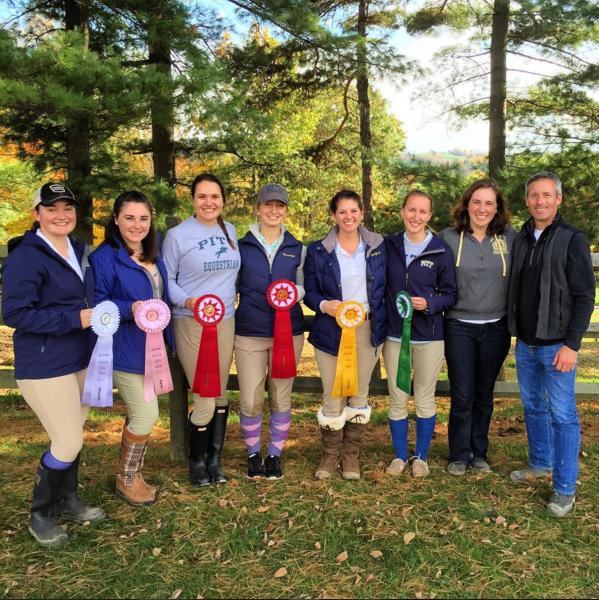Thirty minutes outside of Pittsburgh at BarGee Farms, Elizabeth Morris eases a bridle behind the recently operated-on teeth of Wynn, an attentive and slow-trotting mare.
Equestrians like Morris who ride with the Panther Equestrian Club team rotate horses, depending on what horses might be too tired to practice that day. Wynn is a favorite of Morris’, so she pays careful attention to her health, making sure the metal doesn’t touch the tender parts of her pale gums.
Other sports — football, baseball, lacrosse, hockey — don’t rely on the well-being of 2,000-pound living creatures. But the equestrian club’s seven different lesson horses all come with their own personalities, health needs and quirks that affect what it’s like to ride them. When it comes time for competition, club members have to leave their trusty steeds behind and jump on the backs of unfamiliar horses, hoping that they’ve been cared for just as dutifully.
“That’s my biggest thing as president, is that the horses get treated as they deserve,” club president Sarah Slocum said.
The Panther Equestrian Club has 32 members, each of whom pays $100 in dues and $400 for 10 lessons and is responsible for buying their own boots and helmets. Five members practice at a time, six times per week at BarGee Farms, a full service farm that offers riding lessons, which the club has been visiting for the past five years.
Morris, who is also a dedicated runner with Pitt club cross country, said through the equestrian club she‘s learned to depend on another athlete, who just happens to be a horse.
“It’s weird because [in] running, you care about yourself and if you get tired you slow down,” Morris said. “Having another animal to control makes a big difference.”
Working with animals as an athlete requires extra compassion and flexibility, according to Slocum, particularly when competing at Intercollegiate Horse Show Association events, where the hosting barn provides horses to competitors.
“We have gone to shows where the horses are not as well taken care of, and for me that’s really upsetting. There’s not much we can do about that except treat the horses with the respect they deserve while they’re under our possession,” Slocum, a biology major, said.
As a biology major on a pre-vet track, Morris said she joined the club to dispel any fears before coming face to face with the massive creatures.
“I figured if I never had contact with a horse and I’m too cautious around them, it wouldn’t look good for a large animal vet,” Morris said. Now she has learned there is nothing to be afraid of and works with coach Jim Boyce and more experienced club members.
Over the course of the year, the club competes in 10 regular IHSA competitions, plus Regionals and Zones — the championship round.
Pitt made it to both competitions this year, competing against other schools, including West Virginia University, Slippery Rock University, Allegheny College and Washington & Jefferson College.
To be competitive, Boyce has to teach Pitt equestrians how to look good on any horse.
“With the IHSA, it’s position [that’s most important], because you have to learn how to do the same position on every horse,” Boyce said after a lesson.
The randomized pairings of people and horses mean that riders have to grow accustomed to their horses quickly at competitions — there’s no time to adjust for complications.
The pre-existing abilities and health of a horse can have immense bearing on the final outcome of the competition. But riders have no power over that on borrowed horses.
Because riders don’t use their own horses, senior civil engineering major Becky Glucksman said it takes more than wealth to make a good rider.
“I like [IHSA competitions] more [than conventional shows] because it’s not based on how well-trained of a horse you can buy,” Glucksman said. “It’s not necessarily better because it’s luck of the draw. If your horse is good, great, but if not you just have to be a good rider.”
Of all the special precautions and considerations riders make while riding, only a few are easily visible.
“To be a good rider, you have to be balanced, have good posture, lots of leg muscle and trust in your horse,” Slocum said.
At regionals this past weekend, two of the four team members who competed will move on to the next level of competition near St. Lawrence University in new York.
Emma Gorham won first place in the intermediate fences category, which involves cantering and jumping, and Jamie Spratford won second place in open flat, a category that demonstrates the rider’s abilities on a course without jumps.
Wynn, Icon, Merly and the rest of Pitt’s horses and riders who didn’t make it to Zones will stay in Pittsburgh. For the team, it’s not always about winning or competing — it’s about caring for the animals.
“[Taking careful care is] not as much an inconvenience as the best part of our day,” Morris said. “We’re all from small towns so it’s sort of like a piece of home that we have at school with us. It’s usually the highlight of my week to get to be around horses. I love them so much.”



